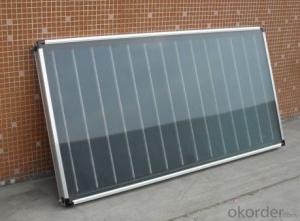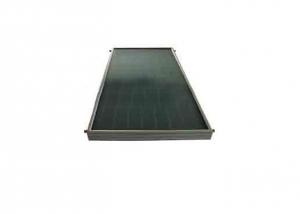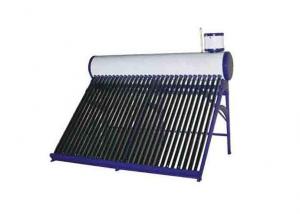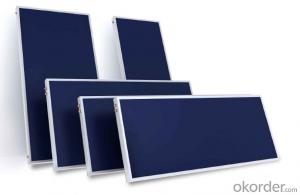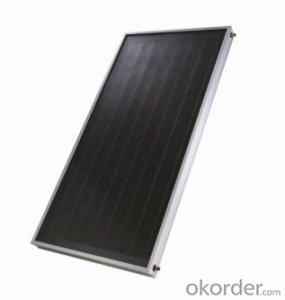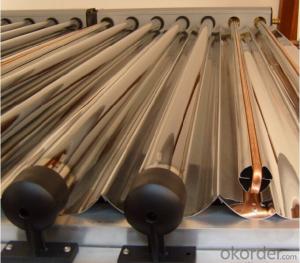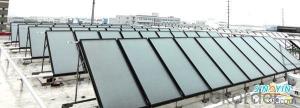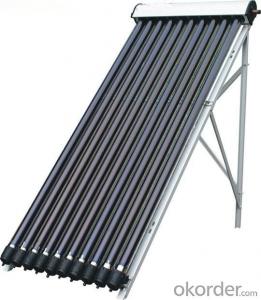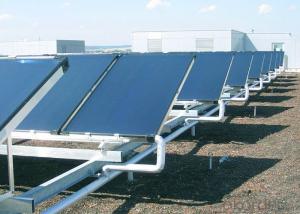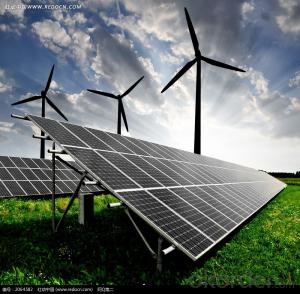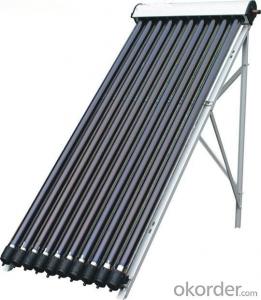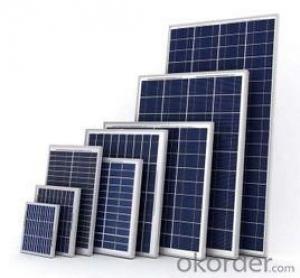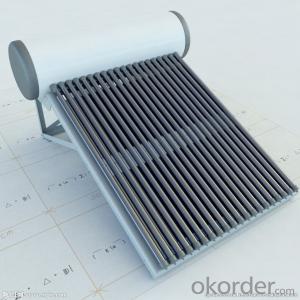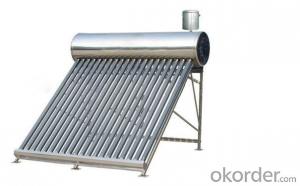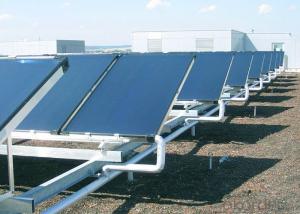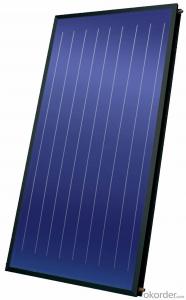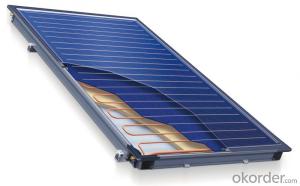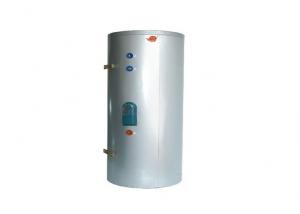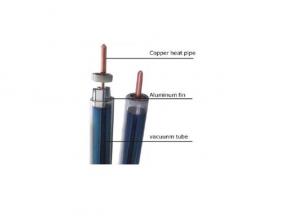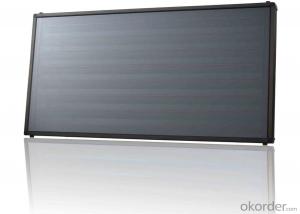Hot Water Solar Collectors - CNBM 2024 Hotel Solar Thermal Collector with 15 Year Warranty for Vacuum Tube
- Loading Port:
- Shanghai
- Payment Terms:
- TT OR LC
- Min Order Qty:
- 500 pc
- Supply Capability:
- 10000 pc/month
OKorder Service Pledge
Quality Product, Order Online Tracking, Timely Delivery
OKorder Financial Service
Credit Rating, Credit Services, Credit Purchasing
You Might Also Like
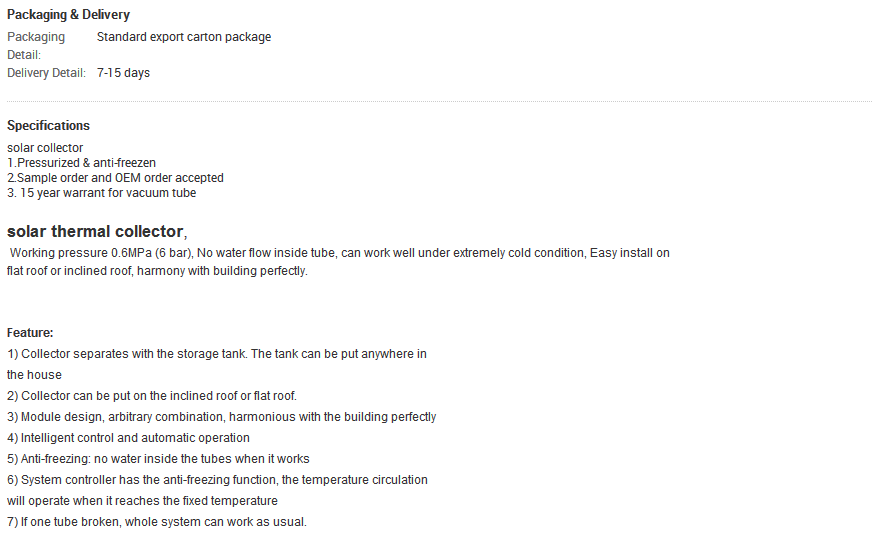
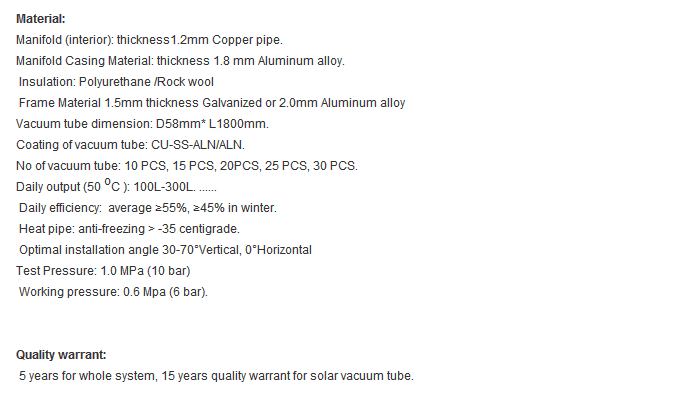
- Q: Can solar collectors be used in areas with limited access to electricity grids?
- Yes, solar collectors can be used in areas with limited access to electricity grids. Solar collectors, such as photovoltaic panels, can generate electricity from sunlight and can function independently of electricity grids. They are particularly suitable for remote areas or off-grid locations where traditional electricity infrastructure is not available or unreliable. Solar collectors offer a sustainable and viable solution for generating electricity in areas with limited access to grids.
- Q: Can solar collectors be used for generating electricity on public transportation systems?
- Yes, solar collectors can be used for generating electricity on public transportation systems. By installing solar panels on the roofs or exteriors of buses, trams, or trains, the energy from the sun can be harnessed and converted into electricity to power various systems on board, such as lighting, air conditioning, or even propulsion. This provides a sustainable and clean energy source, reducing reliance on fossil fuels and decreasing the environmental impact of public transportation.
- Q: Can solar collectors be used for heating restaurants and cafes?
- Certainly, solar collectors can be utilized to heat restaurants and cafes. Solar thermal collectors, also referred to as solar water heaters, are specially designed to convert sunlight into heat energy. By capturing the rays of the sun and transferring the heat to a liquid, such as water or a heat transfer fluid, solar collectors can supply hot water or space heating for various purposes, including restaurants and cafes. Within a restaurant or cafe setting, solar collectors can be employed to heat water for dishwashing, handwashing, and general cleaning needs. They can also be integrated into the establishment's heating system to provide space heating during colder periods. Solar collectors can be installed on rooftops, facades, or in designated areas with ample sunlight exposure to maximize their efficiency. The utilization of solar collectors for heating establishments like restaurants and cafes presents numerous advantages. Firstly, it aids in reducing reliance on fossil fuels and conventional heating methods, thereby lowering greenhouse gas emissions and contributing to a cleaner environment. Moreover, solar energy is a renewable resource, signifying that it is abundant and free, leading to potential cost savings on energy bills in the long term. However, it is important to note that the effectiveness of solar collectors for heating restaurants and cafes may differ based on various factors, such as the size of the establishment, energy demand, geographical location, and available sunlight. Hence, conducting a thorough assessment of the specific requirements and feasibility is crucial before implementing a solar heating system. Seeking guidance from solar energy experts or professional installers can assist in determining the most suitable configuration and ensuring optimal performance.
- Q: Can solar collectors work in cloudy or winter weather?
- Yes, solar collectors can still work in cloudy or winter weather, although their efficiency may be reduced. While direct sunlight is ideal for solar collectors, they can still generate electricity or heat water using diffused or indirect sunlight. However, their performance may be lower compared to sunny conditions. Additionally, advancements in technology have improved the ability of solar collectors to capture and utilize even low levels of light, allowing them to work to some extent even on cloudy or winter days.
- Q: Can solar collectors be used for heating fire stations?
- Yes, solar collectors can be used for heating fire stations. Solar thermal systems can provide heat for water and space heating needs, reducing reliance on traditional heating systems and minimizing energy costs. However, the feasibility and effectiveness of using solar collectors will depend on factors such as the available roof space, local climate, and the heating demand of the fire station.
- Q: Can solar collectors be used in recycling facilities?
- Yes, solar collectors can be used in recycling facilities. Solar collectors can provide renewable energy to power various operations in recycling facilities, such as sorting and processing equipment. Utilizing solar energy in recycling facilities can help reduce reliance on non-renewable energy sources and decrease the carbon footprint of the recycling process.
- Q: Are solar collectors suitable for shopping malls and retail centers?
- Solar collectors can be a great option for shopping malls and retail centers. These establishments typically have large rooftops with ample space for installing solar panels, making them ideal candidates for solar energy generation. Solar collectors can help reduce the reliance on traditional electricity sources, leading to significant cost savings in the long run. Moreover, shopping malls and retail centers have high energy demands due to the extensive lighting, air conditioning, and other electrical systems required to maintain a comfortable shopping environment. Solar collectors can generate a significant amount of electricity during daylight hours, offsetting a substantial portion of the energy consumption and reducing reliance on the grid. Additionally, installing solar collectors can also contribute to the corporate social responsibility goals of shopping malls and retail centers. By utilizing renewable energy sources like solar power, these establishments can reduce their carbon footprint and showcase their commitment to sustainability. This environmentally friendly approach can also resonate positively with customers, potentially attracting more environmentally conscious shoppers. However, it's important to consider certain factors before implementing solar collectors in shopping malls and retail centers. These include assessing the available rooftop space, determining the feasibility of installation, and evaluating the potential return on investment. Additionally, maintenance and monitoring of the solar panels will be necessary to ensure optimal performance and longevity. In conclusion, solar collectors can be a suitable and beneficial option for shopping malls and retail centers. They offer the opportunity to reduce energy costs, demonstrate environmental responsibility, and potentially attract more customers. However, careful planning and evaluation are essential to ensure successful implementation and maximize the benefits of solar energy in these establishments.
- Q: Can solar collectors be used for heating factories?
- Yes, solar collectors can be used for heating factories. Solar thermal systems, which use collectors to capture and convert sunlight into heat energy, can be integrated into the heating systems of factories. This renewable energy source can help reduce the reliance on fossil fuels and lower carbon emissions, making it an environmentally friendly option for heating large industrial spaces.
- Q: How do solar collectors affect visual aesthetics?
- Solar collectors can have both positive and negative impacts on visual aesthetics. On one hand, the sleek and modern design of some solar collectors can enhance the visual appeal of a building or landscape. They can be seen as a symbol of innovation and sustainability. On the other hand, larger and less aesthetically pleasing solar collectors may be viewed as an eyesore, especially in residential areas. The impact on visual aesthetics ultimately depends on the design, size, and integration of solar collectors into the overall architecture or landscape.
- Q: Can solar collectors be used to generate electricity for remote communication systems?
- Yes, solar collectors can definitely be used to generate electricity for remote communication systems. Solar collectors, also known as solar panels or photovoltaic systems, convert sunlight into electricity through the photovoltaic effect. This makes them a highly suitable and efficient source of power for remote communication systems that are typically located in areas with limited access to the main power grid. The use of solar collectors for remote communication systems offers several advantages. Firstly, solar power is a renewable and sustainable energy source, meaning it relies on the abundance of sunlight rather than depletable resources like fossil fuels. This makes it an environmentally friendly choice for powering communication systems in remote locations. Furthermore, solar collectors require minimal maintenance and have a long lifespan, making them a reliable and cost-effective solution for remote areas. They can be installed on rooftops, poles, or even compactly integrated into the design of the communication system itself. This flexibility allows for easy deployment in various remote locations, including rural areas, mountaintops, deserts, and offshore installations. Solar collectors can generate electricity even in low light conditions, thanks to advancements in solar technology. This ensures a continuous power supply for remote communication systems, even during cloudy or overcast days. Additionally, excess energy generated during peak sunlight hours can be stored in batteries for use during periods of low sunlight or at night, providing uninterrupted power to the communication system. Overall, the use of solar collectors for remote communication systems is a practical and sustainable solution. It enables reliable and independent power generation, reduces reliance on traditional energy sources, and contributes to the overall goal of achieving energy efficiency and environmental sustainability.
Send your message to us
Hot Water Solar Collectors - CNBM 2024 Hotel Solar Thermal Collector with 15 Year Warranty for Vacuum Tube
- Loading Port:
- Shanghai
- Payment Terms:
- TT OR LC
- Min Order Qty:
- 500 pc
- Supply Capability:
- 10000 pc/month
OKorder Service Pledge
Quality Product, Order Online Tracking, Timely Delivery
OKorder Financial Service
Credit Rating, Credit Services, Credit Purchasing
Similar products
Hot products
Hot Searches
